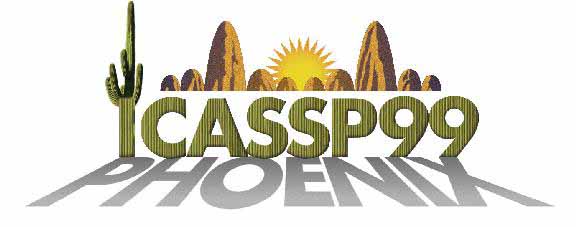Mirror Sites
General Information
Confernce Schedule
Technical Program
| Plenary Sessions | |
| Special Sessions | |
| Expert Summaries | |
| Tutorials | |
| Industry Technology Tracks | |
| Technical Sessions |
Tutorials
Industry Technology Tracks
Exhibits
Sponsors
Registration
Coming to Phoenix
Call for Papers
Author's Kit
On-line Review
Future Conferences
Help
Technical Program Overview |
 |
Welcome to ICASSP-99. We are happy to present you its technical program. We are confident that you will agree with us that the program is of high quality, a tribute to the high caliber of the submissions and the hard work of the members of the technical committees. As is usual for ICASSP, a large number of papers was submitted. This year, we received 1490 regular papers and of these, 867 or about 58 percent were accepted. In addition to these regular papers, the program contains 28 invited papers in the special sessions, for a total of 895 presentations.
As mentioned, the technical committees are central in creating the technical program for ICASSP. Allow us to briefly elaborate this point. After the papers have been received, they are sent to the chairs of the technical committees, according to their category. The committees then each propose a set of sessions, based on their own reviews and on the acceptance-rate guidelines set by the technical chairs. At a final meeting of the committee chairs and the conference technical chairs a technical program is then hammered out. Prior to this ICASSP, the technical committees were reorganized; some familiar names have disappeared and we will have to get used to the new ones. The new committees and their chairs are:
- Audio & Electro-acoustics (Schuyler Quackenbush)
- Communications (Georgios Giannakis)
- Design and Implementation of Signal Processing Systems (Wanda Gass)
- Image & Multidimensional Signal Processing (Edward J. Delp)
- Multimedia Signal Processing (Tsuhan Chen)
- Neural Networks for Signal Processing (Shigeru Katagiri)
- Speech Processing (P.K. Rajasekaran)
- Sensor Array and Multichannel (Donald W. Tufts)
- Signal Process Theory and Methods (Les Atlas)
- Digital Signal Processing Education (Robert Bogner)
In addition to the papers which went through the regular committees, ICASSP-99 has a special industrial track intended for papers with a strong orientation towards application. The review and organization of the papers in this track was coordinated by Bruce Fette of Motorola and Tom Gardos of Intel.
ICASSP-99 has an exciting set of special sessions with invited papers. For this we are grateful to the chairs of these sessions, who proposed and organized them. The special sessions and their chairs are: DSP Education (Robert E. Bogner and Huseyin Abut), Speech Under Stress (John Hansen), Physics-Based Signal Processing (Jeff Krolik), Watermarking/Steganography (Gregory W. Wornell), Sampling (Gilbert Walker and Thomas Strohmer).
ICASSP-99 will have a keynote address as well as four plenary sessions. The conference keynote speaker will be the CEO of XILINX Wim Roelandts with a talk entitled "IC Technology Enables New Programmable DSP Solutions". In addition, there will be four plenary sessions, presented by distinguished speakers. Frederick Jelinek will provide an up-to-date history of speech recognition in his talk "Automatic Speech Recognition: From Watergate to Monica Lewinsky". Chrysostomos L. Nikias will talk about upcoming challenges for signal processing in "Riding the New Integrated Media Systems Wave and Its Signal Processing Challenges". Joe Mitola will speak on "Globalization of the Software Radio" and John Villasenor will provide an engineering perspective on modern communications systems in his talk entitled "An Integrated View of Communications System Design".
This year, there are ten tutorials, coordinated by the tutorial chair, G. Tong Zhou. They cover a large number of topics relevant to the signal processing community: "DSP and MATLAB", "Practical Blind Demodulation: Theory and Design", "Acoustic Echo and Noise Control", "Coding and Compression of Text, Waveforms, and Images", "Robust Estimation with Applications to Signal Processing and Communications Subspace Based Methods for System Identification", "Digital Subscriber Lines: Simulation Techniques and Standard Development Automatic Signal Classification", "Robust Automatic Speech Recognition for Unknown Environment Compensation", and "The Bootstrap: A Powerful Tool for Statistical Signal Processing with Small Sample Sets". We encourage you to join us in participating in the tutorials.
We thank you for your contributions to ICASSP-99: for attending sessions, for presenting papers, for being session chairs, and for performing all those other functions that are needed. We look forward to seeing you in Phoenix!
W. Bastiaan Kleijn and Joseph Picone
Technical Program Chairs
| Last Update: February 4, 1999 Ingo Höntsch |
|